 Culture & Ethics
Culture & Ethics
Fifty Shades of Green

The war on humans continues as attacks against human exceptionalism from the environmental movement keep on coming.
A recent essay in High Country News pushes the meme that Mother Nature should have standing to bring lawsuits in court. From, "Should Nature Have Standing to Sue?" by Adam Sowards, environmental historian at the University of Idaho:
Today, global climate change, biodiversity losses and habitat fragmentation are creating unprecedented social and ecological problems. Environmental crises require serious changes in governance and legal systems and, arguably, in morality…
"The idea that what many take to be inanimate objects (such as trees)," [Michael Nelson, an environmental philosopher at Oregon State University,] says, "or abstract ideas and the places we apply them to (such as wilderness) or even a ‘symbol’ (such as a river) can be wronged in some way, and therefore can be represented or spoken on behalf of, is brave and thoughtful.
And the idea that those who know most about something and care most for it should be the spokesperson seems wise and helpful as we think about the future and what kind of people we need to be or create (a society) that can and should speak about tough natural resource issues in the uncertain future we all face."
In other words, only the most radical environmentalists would speak for "nature." And since many are implacably opposed to humans prospering from earth’s bounty, they would use nature’s legal standing to crash human economies in the name of "saving the planet."
At the very least, legal standing for nature would enable radical Greens to fund themselves through blatant extortion. Whenever a relatively large enterprise planned to engage in building, mining, farming, ranching, etc., the business or individual would have to pay the Greens for protection; either write the check or get sued by "nature."
Even if these suits failed, the obstruction could last years and the time lost and cost of litigation would convince many to pay the extortion.
Anyone who scoff that "it can never happen here" needs to wake up. An orangutan was just declared a "nonhuman person" in Brazil by a court. The New Zealand Parliament has declared one of its rivers to be a person too.
Meanwhile, the nature rights meme is gaining traction. Bolivia, Ecuador, and more than thirty U.S. municipalities have passed laws granting rights to nature — and allowing anyone to sue to protect those rights. An L.A. Times columnist, Michael Hiltzik, is clearly sympathetic.
Nature rights are not necessary for environmental protection. Look at Yellowstone, and we didn’t proclaim Old Faithful to be a person.
We either reject this radical meme or twist ourselves into Gordian knots. That choice should be easy. But I think certain segments of Western civilization are into masochistic self-flagellation and societal bondage — call it "Fifty Shades of Green" — so only time will tell.
Image: Old Faithful, by Debeo Morium (Own work) [CC BY-SA 3.0], via Wikimedia Commons.
